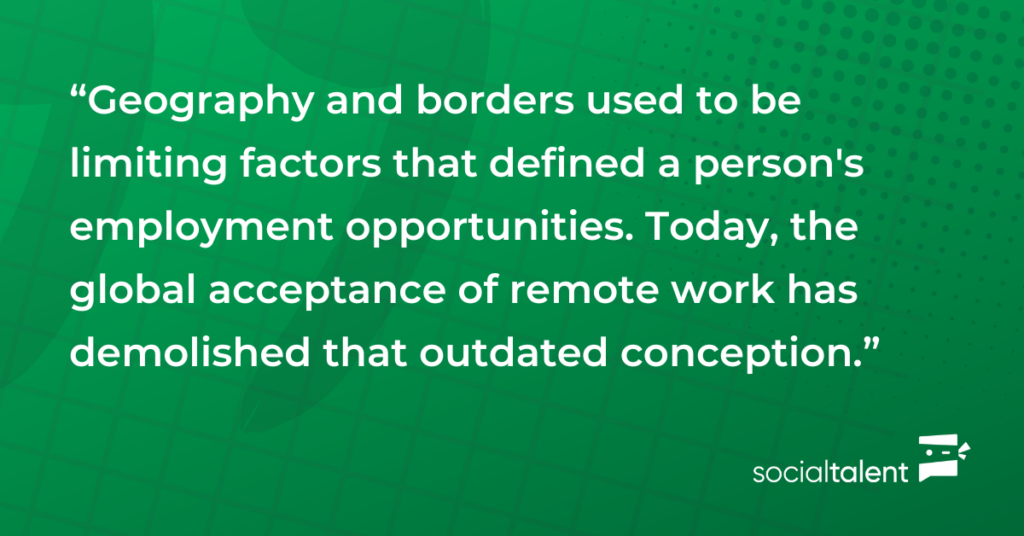Keep up with the latest hiring trends!
When it comes to hybrid and remote work, there is definitely an element of genie and bottle about the whole topic.
COVID provided the nudge (or shove!) to demonstrate how it could be done, and employees widely celebrated. Suddenly, true flexibility could be a reality. And while there has been a need for adaption and iteration around how it all operates, the response has been stark. According to Gallup, 90% of remote capable employees prefer at least some form of work flexibility.
But there has been a huge movement from some organizations to get workers back into the office full time. And it’s been quite ugly. Petitions, attrition, demonstrations, and open letters have all circulated from employees opposing these demands. And it has seen success – KPMG’s 2024 Global CEO Outlook reports that only a third of CEOs predict a full return to office, down from 62% the year before.
But as the threats and mandates and confusion remain, how is this all impacting talent acquisition?
Flexibility is a massive ask from the general candidate slate. LinkedIn has even reported that applications for remote jobs have increased by 146% in the last year alone. Recruiters are seeing time and time again how vital hybrid and remote options are for talent, but particularly for those from diverse and underrepresented backgrounds. And if organizations aren’t willing to be malleable and adjust, they could lose out on huge pools of talent.

Why Flexible Work is so Important for Diverse Hiring
1. Access and Opportunity
Hybrid and remote work options have historically opened doors for underrepresented groups by removing geographical barriers. This means that people who live in remote areas, or those who cannot easily relocate due to family, financial, or other personal reasons, can access opportunities that were previously out of reach. Forcing a complete return to office could potentially limit these opportunities, impacting talent diversity in organizations.
As Talent Summit argues:
“Geography and borders used to be limiting factors that defined a person’s employment opportunities. Today, the global acceptance of remote work has demolished that outdated conception. Savvy remote-first companies have quickly realized this and taken advantage of the boundless talent pool at their fingertips.”
A recent poll SocialTalent conducted found that 88% of organizationas are struggling to find the talent they need. By not leaning into flexibility, companies are essentially cutting off their nose to spite their face.
Learn more: The Strategic Benefits of Hiring International Talent
2. Inclusion and Participation
Remote and hybrid models can help in creating a more inclusive environment for people with visible and non-visible disabilities, and those who might face challenges in the traditional workplace setting due to their mental health or neurodiversity. Flexibility around where you work allows employees to accommodate various personal circumstances, and thus enable a broader range of people to participate effectively in the workforce.
According to Deloitte, unemployment rates for people with disabilities in the US decreased from 12% before the pandemic to 6% as a direct result of remote work. Forcing employees to come into a physical, singular office space every day when it’s not necessary for a role alienates a core of talent that could contribute greatly to success. And it’s not just disability this impacts. LGBTQ+ employees are 13% more likely to prefer hybrid work compared to their heterosexual peers, for non-binary individuals this grows again to 14% (McKinsey). Having options allows talent from all backgrounds to select what works best for them.
Learn more: Listen to our disability hiring specialist, Yasmin Sheikh talk about how to make the hiring process more inclusive:
3. Work-Life Balance
Flexible work arrangements are often cited as a key factor in improving work-life balance, which can be particularly beneficial for women and caregivers. These groups have historically shouldered more responsibilities at home, and flexible policies enable them to better manage these dual demands. A rigid return-to-office policy might disproportionately affect these workers, potentially leading to a decrease in workforce diversity.
McKinsey confirms this, stating that:
“One in five women say flexibility has helped them stay in their job or avoid reducing their hours. A large number who work hybrid or remotely point to feeling less fatigued and burned out as a primary benefit.”
38% of mothers with young children say that without workplace flexibility, they would have had to quit their job or switch to part-time. Add in caregivers, and people with health concerns that require more regular treatment, and suddenly this percentage continues to grow. In an atmosphere where talent and skills are at a premium, why would you opt to reduce your share by mandating an unnecessary return to office?
4. Psychological Safety
The physical workplace doesn’t have a great history when it comes to the treatment of people from underrepresented backgrounds. It’s part of the reason why DEI initiatives are so prevalent and important, as we try to shift the needle in a better direction. From microaggressions and discrimination to a lack of psychological safety and tokenism, employees who don’t necessarily fit a status quo have often come up against barriers and pitfalls.
According to research,
“The ability to work from anywhere can offer enhanced physical and psychological safety for many workers. Virtual environments can facilitate easier discussion of sensitive topics, help break departmental silos, and encourage more feelings of authenticity.”
After the initial wave of the pandemic, Harvard Business Review found that while 21% of white employees felt ready to return to the office, only 3% of their Black peers did. The workplace can be a truly taxing environment when you don’t feel completely seen and included – and this is a massive reason why diverse talent can often far prefer having hybrid or remote options. It gives employees room to breathe, to be themselves, and do their best work.
Learn more: 7 Ways to Make the Workplace A Safe Space

What Can Recruiters do?
It’s a tricky question to answer.
While the benefits of having flexible work for hiring diverse talent are undeniable, if your organization doesn’t offer a hybrid/remote structure, or is pushing for a return-to-office setup, it can seem impossible for TA folk to take advantage. Let’s examine both scenarios.
When Flexibility is an Option
So your organization has flexible work policies and is happy to leverage these to find and hire the best talent. Amazing! Here are a few ways to ensure you’re keeping this messaging front and center:
- Promote Flexibility in Job Listings: Clearly state the availability of flexible work options in job postings. Highlight how these policies support work-life balance, inclusion, and accessibility, appealing directly to those who may prioritize these factors.
- Leverage Flexible Policies in Employer Branding: Use social media, company websites, and professional networks to showcase stories and testimonials from diverse employees who benefit from flexible work arrangements. This demonstrates the company’s commitment to diversity and inclusion.
- Provide Training for Inclusive Hiring Practices: Ensure that hiring teams are aware of the biases that might affect remote or hybrid workers and train them on best practices for inclusive hiring. This can include structured interviews, diverse hiring panels, and ensuring accessibility in the recruitment process.
- Utilize Data to Drive Decisions: Collect and analyze data on how flexible work arrangements impact recruitment, retention, and employee satisfaction among diverse groups. Use this data to continually improve practices and policies.
Learn more: How to Write More Inclusive Job Descriptions
When Flexibility Isn’t an Option or is Under Threat
All may not be lost! This is where being a true Talent Advisor comes to the fore – you have an opportunity to bring awareness and data to this discussion.
- Advocate for Flexibility: Collect internal data and case studies that demonstrate the value of flexible work arrangements, particularly how they contribute to diverse hiring and retention. Present this information to decision-makers to argue for the introduction or continuation of flexible policies.
- Explore Alternative Benefits: If flexibility isn’t possible, look for other benefits and supports that might appeal to diverse candidates, such as comprehensive health packages, support for professional development, or enhanced leave policies. Maybe temporary flexibility is an option?
- Communication and Transparency: It’s tough to write this section, but if flexibility isn’t an option, be transparent about it. Offering a smokescreen won’t help your efforts to hire diverse talent. However, make sure to communicate what the organization is doing to support diversity and inclusion within the existing framework – flexible work might not always be a make-or-break!
Conclusion
As we contemplate the shifting dynamics of today’s workforce, the evidence is clear: return-to-office mandates could significantly hinder diverse hiring and inclusivity.
The widespread preference for hybrid and remote work arrangements is not just a pandemic relic but a pivotal lever in advancing workplace diversity and accessibility. This flexibility opens doors for individuals from underrepresented backgrounds, offering them opportunities previously constrained by geographical and physical limitations. Ignoring this trend risks alienating a vast pool of potential talent, crucial for innovation and competitiveness in a global market.
Organizations must have a more adaptable approach to work environments. By embracing flexibility, they not only cater to a broader demographic but also enhance their appeal and retention rates in a competitive talent landscape. In the quest for a diverse and inclusive workforce, flexibility really isn’t just an option; it’s an imperative.
Looking to hire and engage more diverse talent? It starts with DEI Training.
Reach out to the SocialTalent team today to learn more.
Related Articles
Find out how the likes of IBM, IKEA and Siemens
drive hiring excellence with SocialTalent
drive hiring excellence with SocialTalent
